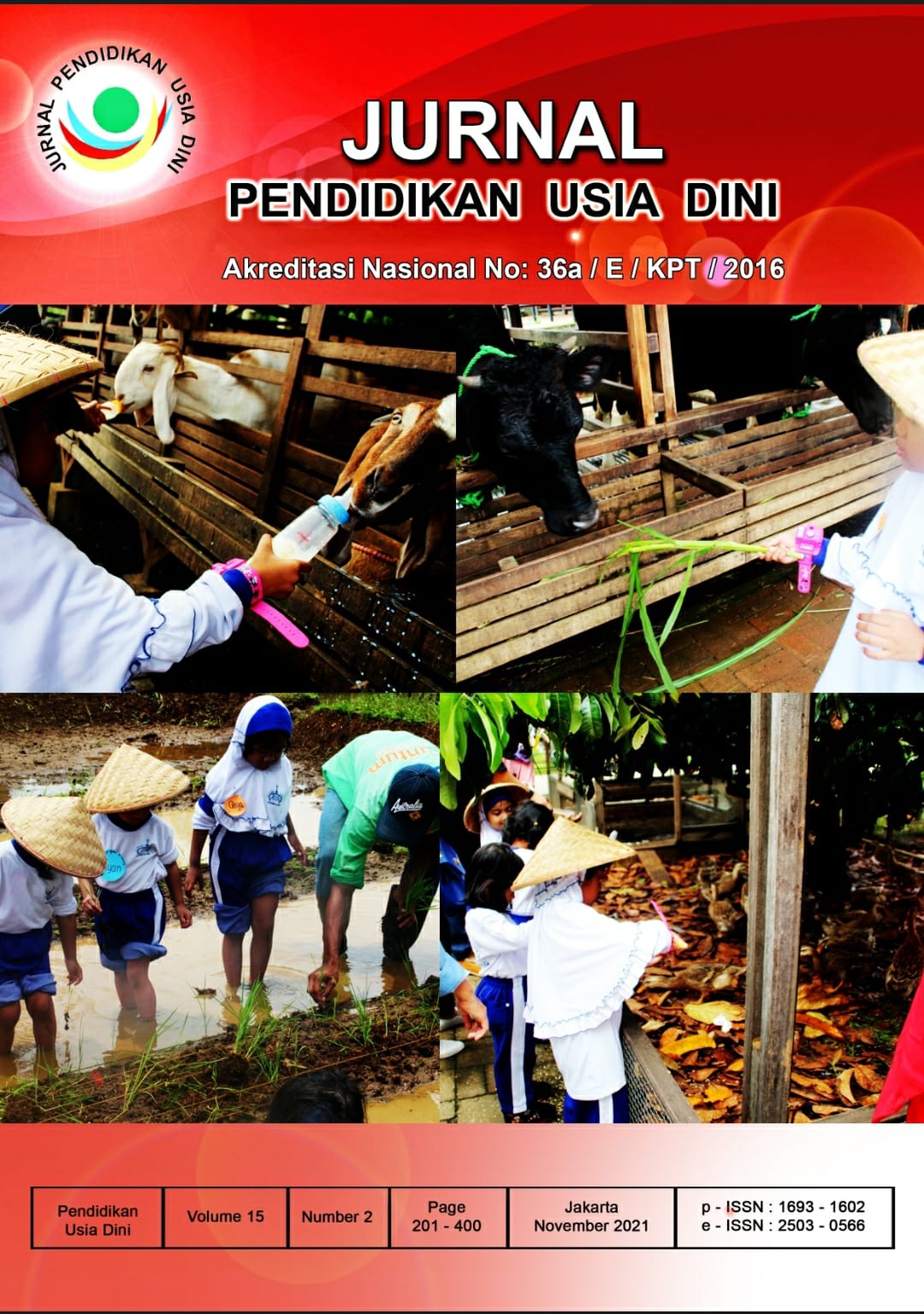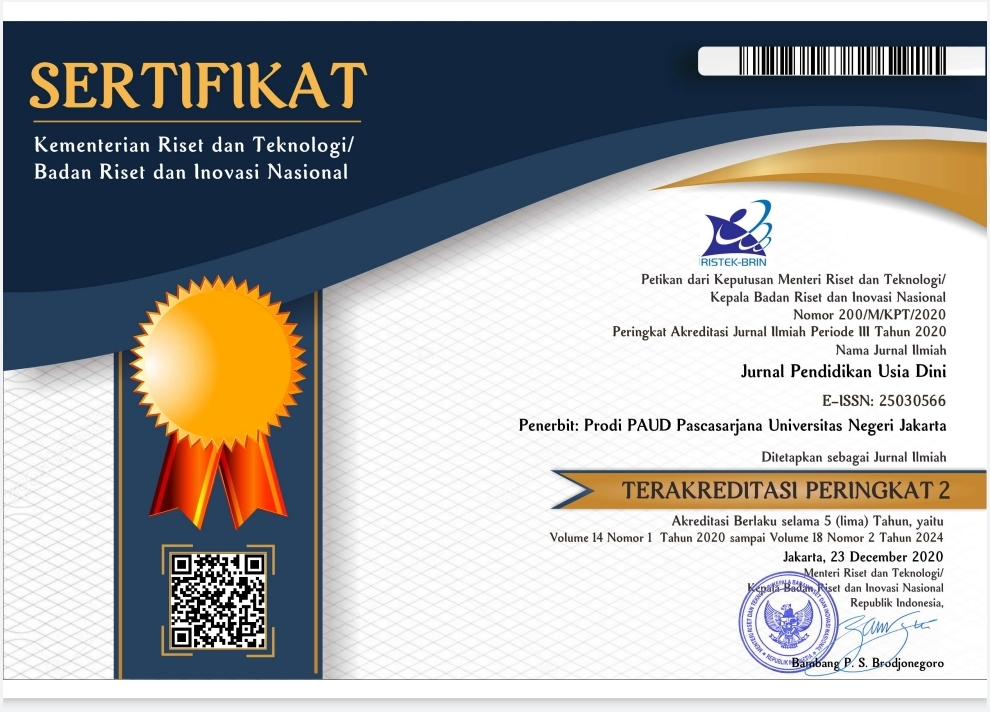The Effect of Edutainment Learning Model on Early Childhood Socio-emotional Development
DOI:
https://doi.org/10.21009/JPUD.152.01Abstract
The idea of edutainment began to become the interest of early childhood educators to make the learning process more holistic, including knowledge about how the brain works, memory, motivation, self-image, emotions, learning styles, and other learning strategies. This study aims to analyse and compare the effect of edutainment and group learning on the socio-emotional development of early childhood. This research method uses a quasi-experimental design with data collection techniques derived from the results of the pre-test and post-test on 20 children. The results of this study indicate that there are differences in the influence of edutainment learning with the control group on the social-emotional development of early childhood. Although both groups affect the socio-emotional development, edutainment learning has a better effect than the control group. For further research, it is recommended to create various types of edutainments learning to improve various aspects of children development.
Keywords: Early Childhood, Edutainment Learning Model, Socio-emotional Development
References:
Afrianti, N. (2018). Permainan Tradisional, Alternatif Media Pengembangan Kompetensi Sosial-Emosi Anak Usia Dini [Traditional Games, Alternative Media for Early Childhood Social-Emotional Competence Development]. Cakrawala Dini: Jurnal Pendidikan Anak Usia Dini, 5(1). https://doi.org/10.17509/cd.v5i1.10405
Alwaely, S. A., Yousif, N. B. A., & Mikhaylov, A. (2021). Emotional development in preschoolers and socialization. Early Child Development and Care, 191(16), 2484–2493. https://doi.org/10.1080/03004430.2020.1717480
Andri Oza, & Zaman, B. (2016). Edutainment dalam Mata Pelajaran Pendidikan Agama Islam. Mudarrisa: Jurnal Kajian Pendidikan Islam, 8(1). https://doi.org/10.18326/mdr.v8i1.117-144
Aubert, A., Molina, S., Schubert, T., & Vidu, A. (2017). Learning and inclusivity via Interactive Groups in early childhood education and care in the Hope school, Spain. Learning, Culture and Social Interaction, 13, 90–103. https://doi.org/10.1016/j.lcsi.2017.03.002
Breaux, R. P., Harvey, E. A., & Lugo-Candelas, C. I. (2016). The Role of Parent Psychopathology in Emotion Socialization. Journal of Abnormal Child Psychology, 44(4), 731–743. PubMed. https://doi.org/10.1007/s10802-015-0062-3
Capurso, M., & Ragni, B. (2016). Bridge Over Troubled Water: Perspective Connections between Coping and Play in Children. Frontiers in Psychology, 7, 1953. https://doi.org/10.3389/fpsyg.2016.01953
Cheng, Y.-J., & Ray, D. C. (2016). Child-Centered Group Play Therapy: Impact on Social-Emotional Assets of Kindergarten Children. The Journal for Specialists in Group Work, 41(3), 209–237. https://doi.org/10.1080/01933922.2016.1197350
Chilingaryan, K., & Zvereva, E. (2020). Edutainment As a New Tool for Development. JAEDU- International E-Journal of Advances in Education, 16, 9.
Chiu, M. M., & Chow, B. W. Y. (2011). Classroom Discipline Across Forty-One Countries: School, Economic, and Cultural Differences. Journal of Cross-Cultural Psychology, 42(3), 516–533. https://doi.org/10.1177/0022022110381115
Chung, K. K. H., Lam, C. B., & Liew, J. (2020). Studying Children’s Social-Emotional Development in School and at Home through a Cultural Lens. Early Education and Development, 31(6), 927–929. https://doi.org/10.1080/10409289.2020.1782860
Crescenzi-Lanna, L., & Grané-Oró, M. (2016). An Analysis of the Interaction Design of the Best Educational Apps for Children Aged Zero to Eight = Análisis del diseño interactivo de las mejores apps educativas para niños de ceroa ocho años.
Creswell, J. W. (2015). Educational research: Planning, conducting, and evaluating quantitative and qualitative research (Fifth edition). Pearson.
Dandashi, A., Karkar, A. G., Saad, S., Barhoumi, Z., Al-Jaam, J., & El Saddik, A. (2015). Enhancing the Cognitive and Learning Skills of Children with Intellectual Disability through Physical Activity and Edutainment Games. International Journal of Distributed Sensor Networks, 11(6), 165165. https://doi.org/10.1155/2015/165165
Denham, S. A. (2006). Social-Emotional Competence as Support for School Readiness: What Is It and How Do We Assess It? Early Education and Development, 17(1), 57–89. https://doi.org/10.1207/s15566935eed1701_4
Eurenius, E., Richter Sundberg, L., Vaezghasemi, M., Silfverdal, S.-A., Ivarsson, A., & Lindkvist, M. (2019). Social-emotional problems among three-year-olds differ based on the child’s gender and custody arrangement. Acta Paediatrica (Oslo, Norway: 1992), 108(6), 1087–1095. PubMed. https://doi.org/10.1111/apa.14668
Goldschmidt, T., & Pedro, A. (2019). Early childhood socio-emotional development indicators: Pre-school teachers’ perceptions. Journal of Psychology in Africa, 29(5), 474–479. https://doi.org/10.1080/14330237.2019.1665887
Guran, A.-M., Cojocar, G. S., & Dioşan, L. S. (2020). Developing smart edutainment for preschoolers: A multidisciplinary approach. Proceedings of the 2nd ACM SIGSOFT International Workshop on Education through Advanced Software Engineering and Artificial Intelligence, 20–26. https://doi.org/10.1145/3412453.3423197
Halle, T. G., & Darling-Churchill, K. E. (2016). Review of measures of social and emotional development. Measuring Social and Emotional Development in Early Childhood, 45, 8–18. https://doi.org/10.1016/j.appdev.2016.02.003
Hamada, M., & Tsubaki, M. (2021). Relationship Analysis between Children Interests and Their Positive Emotions for Mobile Libraries’ Community Development in a Tsunami Area. Qualitative and Quantitative Methods in Libraries, 31.
Heller, S. S., Rice, J., Boothe, A., Sidell, M., Vaughn, K., Keyes, A., & Nagle, G. (2012). Social-Emotional Development, School Readiness, Teacher–Child Interactions, and Classroom Environment. Early Education & Development, 23(6), 919–944. https://doi.org/10.1080/10409289.2011.626387
Hirsh-Pasek, K., Zosh, J. M., Golinkoff, R. M., Gray, J. H., Robb, M. B., & Kaufman, J. (2015). Putting Education in “Educational” Apps: Lessons from the Science of Learning. Psychological Science in the Public Interest, 16(1), 3–34. https://doi.org/10.1177/1529100615569721
Hurlock, E. B. (2001). Developmental Psychology. McGraw-Hill Education. https://books.google.co.id/books?id=DiovBU8zMA4C
Maitner, A. T., Mackie, D. M., Pauketat, J. V. T., & Smith, E. R. (2017). The Impact of Culture and Identity on Emotional Reactions to Insults. Journal of Cross-Cultural Psychology, 48(6), 892–913. https://doi.org/10.1177/0022022117701194
Marcelo, A. K., & Yates, T. M. (2014). Prospective relations among pre-schoolers’ play, coping, and adjustment as moderated by stressful events. Journal of Applied Developmental Psychology, 35(3), 223–233. https://doi.org/10.1016/j.appdev.2014.01.001
McClelland, M. M., & Cameron, C. E. (2011). Self-regulation and academic achievement in elementary school children. New Directions for Child and Adolescent Development, 2011(133), 29–44. https://doi.org/10.1002/cd.302
Mohd Yusof, A., Daniel, E. G. S., Low, W. Y., & Ab. Aziz, K. (2014). Teachers’ perception of mobile edutainment for special needs learners: The Malaysian case. International Journal of Inclusive Education, 18(12), 1237–1246. https://doi.org/10.1080/13603116.2014.885595
Mok, M. M. C. (2019). Social and emotional learning. Educational Psychology, 39(9), 1115–1118. https://doi.org/10.1080/01443410.2019.1654195
Munirah. (2018). Urgensi Pengembangan Sosial dan Emosional Anak Usia Dini. Irfani, 14(1), 19–27.
Nasser, I., Miller-Idriss, C., & Alwani, A. (2019). Reconceptualizing Education Transformation in Muslim Societies: The Human Development Approach. The Journal of Education in Muslim Societies, 1(1), 3–25. JSTOR.
Nikolayev, M., Reich, S. M., Muskat, T., Tadjbakhsh, N., & Callaghan, M. N. (2021). Review of feedback in edutainment games for preschoolers in the USA. Journal of Children and Media, 15(3), 358–375. https://doi.org/10.1080/17482798.2020.1815227
Nurmalitasari, F. (2015). Perkembangan Sosial Emosi Pada Anak Usia Prasekolah. Psikologi UGM, 23(2). https://doi.org/10.22146/bpsi.10567
Okan, Z. (2003). Edutainment: Is learning at risk? Br. J. Educ. Technol., 34, 255–264.
Pojani, D., & Rocco, R. (2020). Edutainment: Role-Playing versus Serious Gaming in Planning Education. Journal of Planning Education and Research, 0739456X2090225. https://doi.org/10.1177/0739456X20902251
Protassova, E. (2021). Emotional development in the educational preschool programs of Soviet and Post-Soviet Times. Russian Journal of Communication, 13(1), 97–109. https://doi.org/10.1080/19409419.2021.1884338
Purwanto, S. (2019). Unsur Pembelajaran Edutainment dalam Quantum Learning. Al-Fikri: Jurnal Studi Dan Penelitian Pendidikan Islam, 2(2). https://doi.org/10.30659/jspi.v2i2.5149
Ren, L., Knoche, L. L., & Edwards, C. P. (2016). The Relation between Chinese Preschoolers’ Social-Emotional Competence and Preacademic Skills. Early Education and Development, 27(7), 875–895. https://doi.org/10.1080/10409289.2016.1151719
Rose-Krasnor, L. (1997). The Nature of Social Competence: A Theoretical Review. Social Development, 6, 111–135.
Rusydi, N. A. (2018). Pengaruh Penerapan Metode Edutainment Dalam Pembelajaran Terhadap Hasil Belajar IPS Murid SD Kartika XX-1. Dikdas Matappa: Jurnal Ilmu Pendidikan Dasar, 1(2). https://doi.org/10.31100/dikdas.v1i2.281
Shodiqin, R. (2016). Pembelajaran Berbasis Edutainment [Edutainment-Based Learning]. Jurnal Al-Maqayis, 4(1). https://doi.org/doi:http://dx.doi.org/10.18592/jams.v4i1.792
Sprung, M., Münch, H. M., Harris, P. L., Ebesutani, C., & Hofmann, S. G. (2015). Children’s emotion understanding: A meta-analysis of training studies. Developmental Review, 37, 41–65. https://doi.org/10.1016/j.dr.2015.05.001
Sutherland, S., Stuhr, P. T., Ressler, J., Smith, C., & Wiggin, A. (2019). A Model for Group Processing in Cooperative Learning. Journal of Physical Education, Recreation & Dance, 90(3), 22–26. https://doi.org/10.1080/07303084.2019.1559676
Vygotski, L. S. (2012). Thought and Language. MIT Press.
Watanabe, N., Denham, S. A., Jones, N. M., Kobayashi, T., Bassett, H. H., & Ferrier, D. E. (2019). Working Toward Cross-Cultural Adaptation: Preliminary Psychometric Evaluation of the Affect Knowledge Test in Japanese Pre-schoolers. SAGE Open, 9(2), 2158244019846688. https://doi.org/10.1177/2158244019846688
Young, E. L., Moulton, S. E., & Julian, A. (2021). Integrating social-emotional-behavioural screening with early warning indicators in a high school setting. Preventing School Failure: Alternative Education for Children and Youth, 65(3), 255–265. https://doi.org/10.1080/1045988X.2021.1898319
Downloads
Published
How to Cite
Issue
Section
License
JURNAL PENDIDIKAN USIA DINI work is licensed under a Creative Commons Attribution 4.0 International License. (http://creativecommons.org/licenses/by/4.0/)





